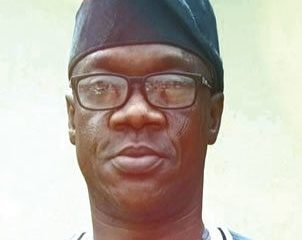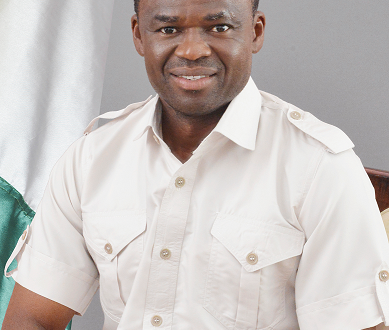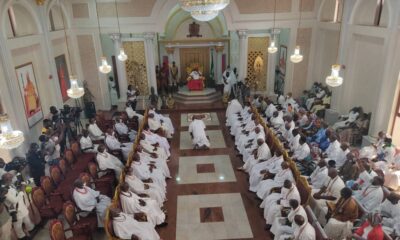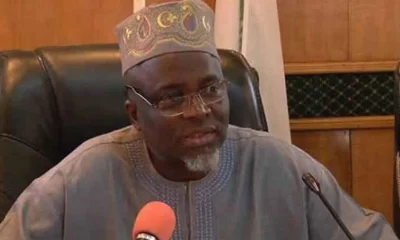News
OPINION: Bobrisky’s Masque, Yahaya Bello’s Boa
Published
2 weeks agoon
By
Editor
By Lasisi Olagunju
“When you reach home, tell my mother,
Say it was a boa that his son transformed into
And never returned home.”
The actor comes on the stage singing and dancing, his troupe festive around him. He invokes his powers and turns into this and that. Everything he fancies, he becomes.
Then he goes back to man.
The world applauds him.
The man becomes a roof-climbing, banana-eating monkey.
The applaud gets louder.
He turns to a woman – like Bobrisky- complete with all the charm of the seductress; he beckons on men who could dare but none comes forward. He gets no suitor. Then, his drummers warn him: Ilè nsú / T’óbá burú tan/ Ìwo nìkan ní ó kù (it is getting dark; you will be alone if things get bad).
If you are warned, listen to what the world is saying. In his ‘The Poetry of the Yoruba Masque Theatre’, Professor J.A. Adedeji (1978) says better what the bata drums say: “Don’t be careless, evening is approaching/ Aiyelabola; If the worst comes/ You will be left alone to your devices.” The tragedy of man, of all of us, is that we always deny the advent of dusk. The masked one hears the beats and ignores the beats. He takes one more step and turns to a boa – and darkness descends on his performance.
The boa-man struggles with himself. He tries every trick in his bag of charms. He chants every incantation in his pouch; he bellows every shout. He draws blank; nothing works again for the influencer. The world has hacked into the actor’s act; life’s principal coders have changed his password. The boa cannot shed the snake skin and adorn the human costume he came with. Aiyelabola will die a boa.
His troupe sings his dirge; his audience his elegy: “Aiyelabola d’ere, o b’ere lo.”
Defeated, Adedeji writes, the boa sings:
“When you reach home, tell my mother,
Say it was a boa that his son transformed into
And never returned home.”
Tell the world, Aiyelabola d’ere, o ti b’ere lo.
When the ‘world’ is involved in someone’s case, what is customarily ignored attracts global opprobrium; even the ordinarily routine becomes problematic, song becomes abuse, and the key that used to open doors stops working. One day, we will know why the young man called Bobrisky was suddenly taken too seriously by drama-loving Nigeria.
FROM THE AUTHOR: OPINION: For Yoruba Muslims And Pentecostals
The pioneer of Yoruba waka music, Batile Alake, invokes chants in her evergreen songs. In a particular album, she sings about entering the farm through the furrow and escaping the whips of the farm owner by not stepping on his (yam) heaps – poro ni mo gbà/ kí olóko má nà mí/ mo ti dá ebeè kojá. In another song, Batile sings about the unusual and the attention which bigness attracts: “B’érin bá w’ojà á j’ogún àpéjowò omo aráyé (when ponderous elephant saunters into the market square, he inherits the world as his audience).” It is possible that Bobrisky, the actor, got that sense from the quaint world of the spirit of money and fame. On social media and in the social sphere, he was/is news – bad and good news – many times not exactly good. But he enjoyed it and sought to live it in defiance of whatever his world thought. He saw the world as a festival of sort and dressed himself up for it in coarse cottons of disgusting shock. Listening to strange beats, the man danced his way into the moral marketplace as a woman and stepped on the toes of his world.
For breaking a pot of water, the child who repeatedly spilt drums of palm oil without consequences was docked in a court in Lagos some days ago. Bobrisky is in jail for doing what Duro Ladipo calls “ritual theatre”, that which many do impulsively as a cultural practice – spraying money at social parties. In the times of our fathers, ‘spraying’ was not the word; money meant for the forehead never touched the ground. If it did, it was a taboo broken. But, today, àkàrà has become bones in the mouth of the toothless. Money-miss road nouveau riche dudes dance on a canvass of cash to proclaim their success. What autumn does to leafy trees is what they do with the naira. They carpet the ground with careless currency notes, plod rough-shod and record their misbehaviour for us to sorrow about. They incite the poor to query the poverty in their destiny.
I read a piece on “Ritual Killing, 419, and Fast Wealth in Southeastern Nigeria” published in the ‘American Ethnologist’ of November 2001. The author, Daniel Jordan Smith, marvels at what we do here with paper money on foreheads at social parties. He explores the drama of our doing it, how we do it and why we do it: “The act of spraying itself has become a performance, and those who do the spraying are often drawing public attention to themselves as much as to those they are supporting. In the act of spraying, the dance of the sprayer is watched and admired, but most importantly, the quantity and denomination of the bills pasted to the foreheads of the sprayee is closely monitored. People who spray large sums of money are roundly applauded by the crowd…” The paradox (and the lesson) here is what Smith admits: “such ostentation is resented even as it is admired.”
FROM THE AUTHOR: OPINION: Flying Gods, Lying Prophets And Power Bandits
Singer Portable’s ‘brother’ who claims ‘sisterhood’ is a goat immolated to make other goats stop misbehaving. Won pa iji han iji. But, he is just an actor, a masquerader monetizing his mime of our unserious world. And we are really unserious. Of all the inmates in our house of sin; of all the sicknesses in our sick body, Bobrisky is what takes our precious time and judgment. Locking him up is our loss.
A perfect Aristotelian tragic protagonist, he will be in solitary misery for six months at our expense. Everyone thinks he deserves to be where he is. Even those of us who accept that he is just an alárìnjó (itinerant, walk-and-dance masquerade) insist that his choice of style is dirty. But there is neither disgust nor ugliness in drama. It is either a tragedy or a comedy or the concoction in the middle. Everything is about costuming and packaging and marketing. If my good old literature teacher, Professor Oyin Ogunba (God bless his soul), were around and he watched this spectacle, he would describe the man as drama. Read Ogunba in Oyekan Owomoyela’s ‘Give me Drama Or…’ I did. “A masked figure at a festival,” Ogunba argues, “whether he dances or speaks or does neither, has, by his mere appearance, created a situation of potential dramatic value.” The jailed young man has the mask; he has the chant; he has the gait, the dance. He has the drama and an excitable audience. His face and costume are just life-mimicry gone awry. He shouldn’t have suffered an overkill.
In the grove of life’s principals, there are many masks of varying potency. It appears that Bobrisky entered the grove without paying his dues. It is ìbà that saves goat from being tied down as sacrificial lamb. He didn’t do that and lost control of his panel. There is no system the world cannot hack into; the principalities of this plane are code-crackers. They reduced the cross-dresser to a helpless influencer who could not influence the winds from blowing him into jail. It happened to Aiyelabola, the powerful masque-actor who turned himself into a boa for effect but could not go back to the human he was.
The world overtook Bobrisky and locked him up. He thought he could recreate himself to a woman and be crowned queen of the covens. He didn’t learn from Aiyelabola who moved from man to boa and slithered off forever as boa. May we not step on the eye of the earth.
Bobrisky is a metaphor for the hypocrisy of this society of masked men and specialists. He is also a metaphor for self-violation. In court, he disowned his feminine costume and pronounced himself man. He is, in significant ways, a metaphor for a politician called Yahaya Bello. What happened to the cross-dresser is exactly what is happening to the former Kogi State governor. He is being asked by his troupe mates – the igneous caste of his cast – to come out and account for his years in power. There is a big lesson here: An Egungun that is conscious of life out of the mask will behave well, will limit his performance to dance and songs; will carry no whips, and will whip not the helpless.
FROM THE AUTHOR: OPINION: FG’s N90 Billion Hajj Politics
Andu is the name of one Egúngún (eégún) in a Yoruba town which enjoys the throne with the king. Ulli Beier in his ‘The Egungun Cult Among the Yoruba’ (Presence Africaine, 1958: 34) says “Andu enjoys great power and privileges. He may, for example, sit on the king’s throne when the king is not present.” What do you think would happen if this Egungun extends his privileges and starts contesting the stool with the king, the Timi of Ede? The storm and the drama that we saw around Bello last week were what normally happens to temporary men who think themselves permanent. When ‘big’ men eat food meant for the gods and step on sacred toes and the world takes note, they are condemned to run kitikiti katakata as Bello did last week. The consequence he suffers is the fate of the bird called agbe: his feathers got dyed in indigo. The aluko bird was not created henna, his colour was made so by an angry world. When the world felt offended enough by the egret’s unacceptable ways, it dipped the bird in a pot of snow-white chalk. The world is sufficiently angry with the actor called Yahaya Bello; it is cooking a pot of bile for him to feast on.
One Muslim cleric waxed a record in the 1970s with a line that made a lot of sense. I can’t remember the cleric’s name but I can’t forget that he sings about the powerful who think themselves faster than life. But, he says, the world is not that cheap; it storms their sail and sinks their ship. “Won ro pe won le aye won ba/ Aye o je bee/aye da won nu.” The Titanic, its competent crew and its arrogant builders come to mind here.
My people would look at Yahaya Bello and see the opposite of careful chameleon who walks gingerly through life. Chameleon is asked why his feet rarely touch the ground. He says it is in deference to the earth; he says the ground must not cave in under his weight. “This world (aye) is a dangerous and difficult place; it is full of negative forces that hinder, even destroy, one’s life.” Benjamin C. Ray was of the University of Virginia, Charlottesville, United States, when in 1993 he wrote the above quote in a research article on ‘Aladura Christianity: A Yoruba Religion’. The quote, peeled from Ray’s 27-page piece on ‘aye’ and its forces, summarizes what I am saying here about moderation, about doing right and stepping away from wrong even if you have the grit of a lion. Ray is not alone. Professor Karin Barber’s scholarship is on Yoruba’s ways and means. Her mental visage on man and precarious power, published in a journal called ‘Africa’ in 1981, sees the solitary worldly ‘man’ who is “picking his way …between a variety of forces, some benign, some hostile, many ambivalent.”
Did Shakespeare not say justice whirls in equal measure? Today’s eegun, our ensemble of powers and principalities, can also learn from the fate of Bello, a whitened lion in flight. Their own festival of immunity will end one day, and the children of the grove will no longer have free balls of bean cakes. Listen. The antidote to darkness is light. If you don’t want to die a boa, don’t live a boa. What is happening to Bello tells even deities that they are not immune from (and to) the ravages of an incensed world. When the forces of life face and fight a rogue masquerade, they tear off his mask and call women to come and watch. And, of course, an Egungun dies the day he is paraded naked before a coven of weird beings who piss from behind.
You may like
News
Operation Feed Edo: Obaseki Launches Christians Feeding Programme, Distributes 10kg 60k Bags Of Rice
Published
1 hour agoon
May 3, 2024By
Editor
Governor Godwin Obaseki of Edo State, on Friday, said he has earmarked nothing less than N1bn Naira monthly to feed vulnerable Christians in the state in the next three months.
This is as he said a similar programme has been mapped out for people in the Muslim faith in the state.
Obaseki disclosed this during the official flag-off of phase one of Edo State Food Support Programme also known as Christian Feeding Programme in Benin City.
The Governor, who said he was worried by the rising number of people who cannot afford a square meal in a day in the state, said he had to call Christian leaders in the state on how best to address the alarming situation.
READ ALSO: Group Mulls Legal Option To Stop IOCs’ Divestment From N’Delta
Obaseki said in order not to make it look political, he decided not to involve political office holders, but Christian leaders in reaching out to vulnerable Christians in the state.
The Governor who added that the state government already had data of the vulnerable in the state database, said the means of reaching out to them maximally was the issue, hence using churches to reach out to them.
He said: “I was worried by the rising number of people who cannot afford a square meal in a day. So, I thought to myself how do we solve this problem. This is not politics I told myself.
“I then called the chairman of Christian Association of Nigeria (CAN) and some of the blockheads to a meeting and explained to them what I intended to do. So, that’s how we put our heads together to come up with this programme.”
READ ALSO: Officer Who Shot Man Dead During Fuel Queue Tumult Identified — Lagos Police
Obaseki added: “I told them this is the amount of money I will be giving you every month. I’ll give you a billionaire monthly for three months first. At least, Let us try this for the first three months.”
The governor said the programme was not just to feed the vulnerable, but also together more data about people in the state on how the government can create employment for them and how the government can render help where necessary.
Earlier, in his remarks, Chairman of the Organising Committee who also doubles as the Chairman, CAN,
Apostle Irekpono Omoike, while thanking the governor for the initiative, said 10kg of 60,000 bags of rice have been purchased for onward distribution to the three senatorial districts in the state.
According to him, 27,000 bags of the 10kg would be distributed to the seven local government areas in Edo South, 15 bags to Edo Central and 18 bags to Edo North.
Further giving the breakdown, Omoike said 3, 000 bags would be distributed to each local government across the 18 local government areas, summing upto 54,000 bags, while the remaining 6,000 bags would be distributed to churches not captured under CAN.

Shell Nigeria Gas and the Oyo State Government have signed an agreement to develop a gas supply and distribution infrastructure that will deliver gas to industrial and commercial users in the state.
A statement released on Friday by Shell Nigeria’s Media Relations Manager, Abimbola Essien-Nelson, disclosed that SNG will build and operate the gas distribution network which will serve customers across Oyo State for 20 years.
According to the statement, the project will start with the construction of gas distribution infrastructure along a 15km pipeline route, adding that it will grow to deliver up to 60 million standard cubic feet of gas per day across the state.
It was learnt that the first gas is expected in the fourth quarter of 2025.
READ ALSO: Dave Umahi Trends Online After ‘Me I No Hear Phone’ Comment On Live TV [VIDEO]
Speaking at the signing ceremony, the Oyo State Governor Seyi Makinde, described the project as a catalyst for development in the state.
Makinde said, “This project fits into our plan to drive innovation and industrialisation in Oyo State and we’re ready to partner with more companies and other organisations to enhance the delivery of relevant projects”.
Speaking, the Managing Director of SNG, Ralph Gbobo, noted that the agreement was “a significant milestone for SNG and Oyo State to boost economic activities in Nigeria by supplying industries and manufacturers with natural gas, a more reliable, cost-efficient and environmentally friendly source of energy”.
He explained, “The gas distribution project will be a game-changer in the industrialisation drive of the Oyo State Government and help boost internally generated revenue and result in more job opportunities.
READ ALSO: 19-year-old Convicted For Dating, Impregnating 14-year-old Sister
“For SNG, the project is a milestone in our effort to continue growing the energy supply to businesses in Nigeria in line with Nigeria’s ambition to drive progress on the back of natural gas availability across Nigeria under the Decade of Gas initiative”.
The Managing Director of The Shell Petroleum Development Company of Nigeria Limited and Chairman, Shell Companies in Nigeria, Osagie Okunbor remarked that the event pointed to the value of partnership as “Shell continues to power progress” in Nigeria through more and cleaner energy solutions for commercial and industrial customers.
“Building on our presence in the country since the 1960s and the wide marketing and trading reach of Shell Energy, we are excited about developing gas distribution solutions and delivering competitive and reliable energy for power generation and industrial use across Nigeria,” Okunbor added.
SNG was incorporated in 1998 as a fully Shell-owned company. Over the years, the company has become a supplier of gas and now serves over 150 clients in Abia, Bayelsa, Ogun and Rivers states.
READ ALSO: Group Mulls Legal Option To Stop IOCs’ Divestment From N’Delta
The PUNCH reports that the Federal Government said it would stop granting licences to gas companies with no capacity to build pipelines for gas distribution.
This, the government said became necessary to discourage the transportation of compressed natural gas through the roads.
The Minister of State for Petroleum (Gas), Ekperikpe Ekpo, made this disclosure when he was in Abeokuta, the Ogun State capital on Wednesday.
While saying the country must transit from fossil fuel to CNG, Ekpo revealed that he had directed the Chief Executive of the Nigerian Midstream and Downstream Regulatory Authority, Farouk Ahmed, not to issue licenses to anyone who could not pipe CNG to the end users.
News
15-year-Old Public School Student Scores 362 In UTME
Published
8 hours agoon
May 3, 2024By
Editor
A student of a public secondary school, Government Secondary School, Omu Aran, Kwara State, Olukayode Victor Olusola, scored 362 marks in this year’s Unified Tertiary Matriculation Examination, UTME, to be among the contenders for the highest scorers in the examination.
Though the Registrar of the Joint Admission and Matriculation Board, JAMB, Prof. Isaq Oloyede, organisers of the exam, had said the Board would not announce the highest scorer to avoid last year’s experience of confusing claims, Olukayode’s score is celebratory, as it is among the highest in recent years.
He scored 95 marks each in Mathematics, Physics and Chemistry and 77 in English Language.
READ ALSO: 2024 UTME: JAMB Withholds Results Of 64,624 Candidates
His exploit is coming against the backdrop of the poor performance of candidates in the exam in which 1.4 million scored less than 200 marks out of 400. The exam was taken by over 1.8 million candidates
Also, Olukayode’s excellent performance is coming at a time when confidence is greatly eroding in what public schools have to offer and some private schools are boasting of being the most expensive in the country.
READ ALSO: BREAKING: JAMB Releases 2024 UTME Results
Olukayode was born in 2009 and hopes to study Electrical Electronic at the University of Ilorin, Kwara State.
His mother, Beatrice Tosin, while giving all the honour to God, also praised the studious and hard working nature of her child.

PHOTOS: Sandhurst Trained: UK High Commissioner Hosts First Nigerian Female To Graduate From Premier British Military Institution

Operation Feed Edo: Obaseki Launches Christians Feeding Programme, Distributes 10kg 60k Bags Of Rice

Shell Set To Build Gas Pipelines In Oyo
Trending

 Politics2 days ago
Politics2 days agoWhy Candidate Who Needs Interpreter Can’t Be Edo Gov – Shaibu

 Metro5 days ago
Metro5 days agoEdo Police Arrest Suspected Cultists Who Allegedly Killed Rival In His Daughter’s Presence

 Business3 days ago
Business3 days agoCustomers Panic As CBN Bans Opay, Palmpay, Others’ New Accounts

 News2 days ago
News2 days agoEx-policeman Who filmed Wife Having Wex With Her Superior Found Guilty Of Stalking

 News4 days ago
News4 days agoOoni: Suspended Benin Palace Functionaries Banished

 News3 days ago
News3 days agoJUST IN: FG Approves Salary Increase For Civil Servants

 News4 days ago
News4 days agoBREAKING: JAMB Releases 2024 UTME Results

 News4 days ago
News4 days ago2024 UTME: JAMB Withholds Results Of 64,624 Candidates

 Metro2 days ago
Metro2 days agoMother Of Four Hacked To Death By Neighbour, Son In Edo

 Metro5 days ago
Metro5 days agoGunmen Assassinate Governor Aiyedatiwa’s Campaign Coordinator In Ondo





























